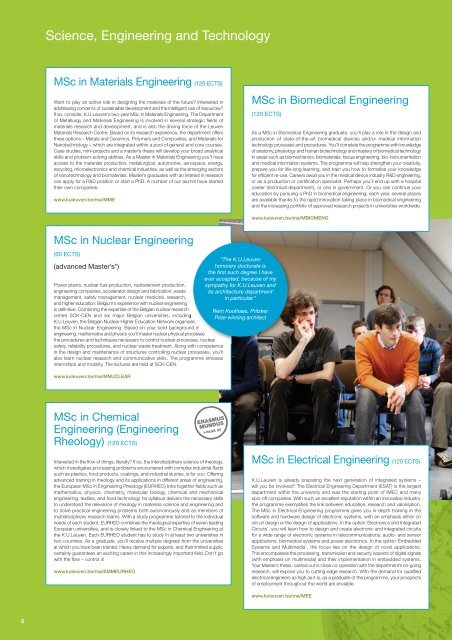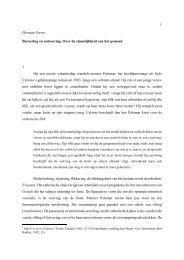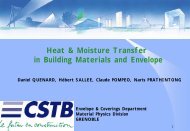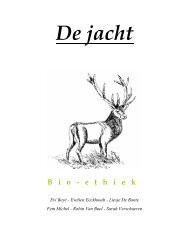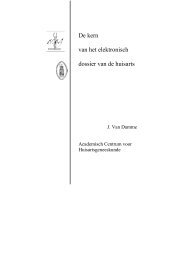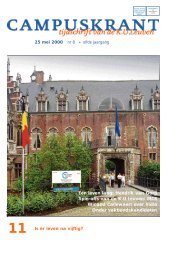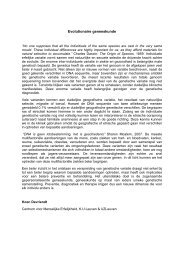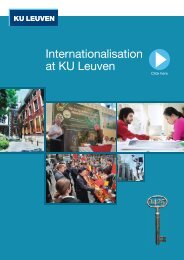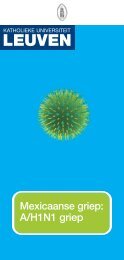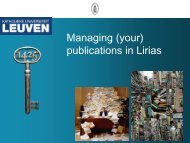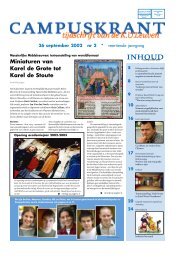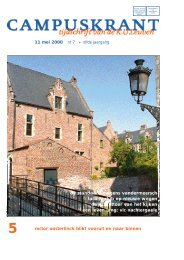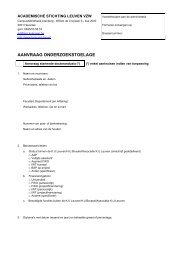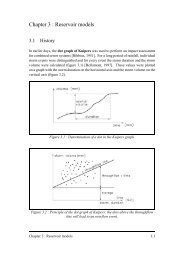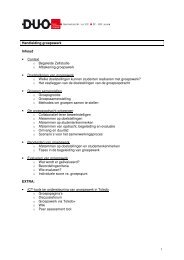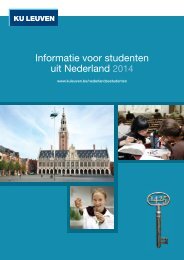International Programmes - KU Leuven
International Programmes - KU Leuven
International Programmes - KU Leuven
Create successful ePaper yourself
Turn your PDF publications into a flip-book with our unique Google optimized e-Paper software.
Science, Engineering and Technology<br />
MSc in Materials Engineering (120 ECTS)<br />
Want to play an active role in designing the materials of the future? Interested in<br />
addressing concerns of sustainable development and the intelligent use of resources?<br />
If so, consider, K.U.<strong>Leuven</strong>’s two-year MSc in Materials Engineering. The Department<br />
of Metallurgy and Materials Engineering is involved in several strategic fields of<br />
materials research and development, and is also the driving force of the <strong>Leuven</strong><br />
Materials Research Centre. Based on its research experience, the department offers<br />
three options – Metals and Ceramics, Polymers and Composites, and Materials for<br />
Nanotechnology – which are integrated within a pool of general and core courses.<br />
Case studies, mini-projects and a master’s thesis will develop your broad analytical<br />
skills and problem-solving abilities. As a Master in Materials Engineering you’ll have<br />
access to the materials production, metallurgical, automotive, aerospace, energy,<br />
recycling, microelectronics and chemical industries, as well as the emerging sectors<br />
of nanotechnology and biomaterials. Master’s graduates with an interest in research<br />
can apply for a R&D position or start a PhD. A number of our alumni have started<br />
their own companies.<br />
www.kuleuven.be/ma/MME<br />
MSc in Biomedical Engineering<br />
(120 ECTS)<br />
As a MSc in Biomedical Engineering graduate, you’ll play a role in the design and<br />
production of state-of-the-art biomedical devices and/or medical information<br />
technology processes and procedures. You’ll complete the programme with knowledge<br />
of anatomy, physiology and human biotechnology and mastery of biomedical technology<br />
in areas such as biomechanics, biomaterials, tissue engineering, bio-instrumentation<br />
and medical information systems. The programme will help strengthen your creativity,<br />
prepare you for life-long learning, and train you how to formalise your knowledge<br />
for efficient re-use. Careers await you in the medical device industry R&D engineering,<br />
or as a production or certification specialist. Perhaps you’ll end up with a hospital<br />
career (technical department), or one in government. Or you can continue your<br />
education by pursuing a PhD in biomedical engineering; each year, several places<br />
are available thanks to the rapid innovation taking place in biomedical engineering<br />
and the increasing portfolio of approved research projects in universities worldwide.<br />
www.kuleuven.be/ma/MBIOMENG<br />
MSc in Nuclear Engineering<br />
(60 ECTS)<br />
(advanced Master’s*)<br />
Power plants, nuclear fuel production, radioelement production,<br />
engineering companies, accelerator design and fabrication, waste<br />
management, safety management, nuclear medicine, research,<br />
and higher education: Belgium’s experience with nuclear engineering<br />
is definitive. Combining the expertise of the Belgian nuclear research<br />
centre SCK-CEN and six major Belgian universities, including<br />
K.U.<strong>Leuven</strong>, the Belgian Nuclear Higher Education Network organises<br />
the MSc in Nuclear Engineering. Based on your solid background in<br />
engineering, mathematics and physics you’ll master nuclear physical processes,<br />
the procedures and techniques necessary to control nuclear processes, nuclear<br />
safety, reliability procedures, and nuclear waste treatment. Along with competence<br />
in the design and maintenance of structures controlling nuclear processes, you’ll<br />
also learn nuclear research and communicative skills. The programme stresses<br />
internships and mobility. The lectures are held at SCK-CEN.<br />
www.kuleuven.be/ma/MNUCLEAR<br />
“The K.U.<strong>Leuven</strong><br />
honorary doctorate is<br />
the first such degree I have<br />
ever accepted, because of my<br />
sympathy for K.U.<strong>Leuven</strong> and<br />
its architecture department<br />
in particular.”<br />
Rem Koolhaas, Pritzker<br />
Prize-winning architect<br />
MSc in Chemical<br />
Engineering (Engineering<br />
Rheology) (120 ECTS)<br />
ERASMUS<br />
MUNDUS<br />
PAGE 20<br />
Interested in the flow of things, literally? If so, the interdisciplinary science of rheology,<br />
which investigates processing problems encountered with complex industrial fluids<br />
such as plastics, food products, coatings, and industrial slurries, is for you. Offering<br />
advanced training in rheology and its applications in different areas of engineering,<br />
the European MSc in Engineering Rheology (EURHEO) links together fields such as<br />
mathematics, physics, chemistry, molecular biology, chemical and mechanical<br />
engineering, textiles, and food technology. Its syllabus delivers the necessary skills<br />
to understand the relevance of rheology in materials science and engineering and<br />
to solve practical engineering problems both autonomously and as members of<br />
multidisciplinary research teams. With a study programme tailored to the individual<br />
needs of each student, EURHEO combines the rheological expertise of seven leading<br />
European universities, and is closely linked to the MSc in Chemical Engineering at<br />
the K.U.<strong>Leuven</strong>. Each EURHEO student has to study in at least two universities in<br />
two countries. As a graduate, you’ll receive multiple degrees from the universities<br />
at which you have been trained. Heavy demand for experts, and their limited supply,<br />
certainly guarantees an exciting career in this increasingly important field. Don’t go<br />
with the flow – control it!<br />
www.kuleuven.be/ma/EMMEURHEO<br />
MSc in Electrical Engineering (120 ECTS)<br />
K.U.<strong>Leuven</strong> is already preparing the next generation of integrated systems –<br />
will you be involved? The Electrical Engineering Department (ESAT) is the largest<br />
department within the university and was the starting point of IMEC and many<br />
spin-off companies. With such an excellent reputation within an innovative industry,<br />
the programme exemplifies the link between education, research and valorisation.<br />
The MSc in Electrical Engineering programme gives you in-depth training in the<br />
software and hardware design of electronic systems, with an emphasis either on<br />
circuit design or the design of applications. In the option `Electronics and Integrated<br />
Circuits’, you will learn how to design and create electronic and integrated circuits<br />
for a wide range of electronic systems in telecommunications, audio- and sensor<br />
applications, biomedical systems and power electronics. In the option `Embedded<br />
Systems and Multimedia’, the focus lies on the design of novel applications.<br />
This encompasses the processing, transmission and security aspects of digital signals<br />
(with emphasis on multimedia) and their implementation in embedded systems.<br />
Your Master’s thesis, carried out in close co-operation with the department’s on-going<br />
research, will expose you to cutting-edge research. With the demand for qualified<br />
electrical engineers as high as it is, as a graduate of the programme, your prospects<br />
of employment throughout the world are enviable.<br />
www.kuleuven.be/ma/MEE<br />
6


